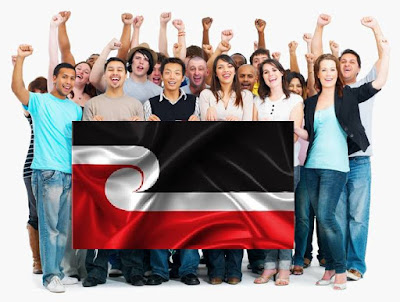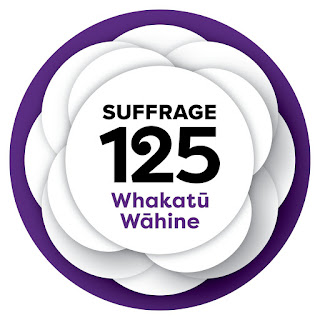Issues with Biculturalism and Multiculturalism
I have a problem with state policies of biculturalism and multiculturalism. First of all, biculturalism is a problematic concept that only recognises two existing cultures in this country called “New Zealand”, and it is used more so to legitimise Pakeha dominance and government rather than as a genuine attempt to reconcile the invasion, stealing, cheating and manipulation of the Pakeha colonial past. With popular opinion shifting through indigenous agitation and struggle, Maori are recognised as tangata whenua and indigenous inhabitants of Aotearoa, at least legally and formally under a liberal democracy. Biculturalism as based on Treaty principles of partnership, participation and protection is rather void in practice. Partnership implies an equal positioning of power, which is not the case in practice. The extent of participation and what forms of participation are legitimate are still under the governance of the state. Protection is also selective and what exactly is being protected, who is being protected, how they are protected and what they are protected from is all done under the terms of the state. Within this bicultural model, all the terms and conditions are set by the Pakeha state, so nature of this bicultural relationship allows little room for autonomy and self-determination. By claiming New Zealand as a bicultural country, gives visibility to the colonial and colonised cultures, but it does not actually give equal status. It’s a fluffy white liberal idea for NZ to be a bicultural nation because it does not actually threaten the power of Pakeha society and government but further attempts to legimitise it using a more underhanded strategy (even if that wasn’t the intention, it seems to be the effect).
Within this discussion around bi or multi-culturalism, the idea of culture is never really defined. Coming from an anthropological perspective, the idea of culture is a contested and ever-changing concept that has different meanings in different contexts. What does it mean when state policies of biculturalism or multiculturalism are implemented? If culture is taken to be the visible and tangible things that is defined under the terms made by a Pakeha-dominated state, then it is established within a framework directed by the state.
The other obvious problem with the idea of biculturalism is – what does that mean for those who aren’t identified as or identify themselves as Maori or Pakeha? Where does the existence of other minority cultures fit into this bicultural framework?
In a tutorial discussion I had today, there was a woman saying that biculturalism can mean Maori and non-Maori. But if we take this idea of culture to mean ‘a way of life’, which has had changing meanings in different contexts and still does, then that makes no sense to lump all other minority cultures in the same boat as Pakeha culture. There are major differences in power relationships between minority groups and Pakeha which manifests in a similar hierarchical relationship as Maori/Pakeha relationship, and many of us have had to deal with European colonialism/imperialism in our own countries and the racism and ethnocentrism of Pakeha culture in Aotearoa. To put us in the same boat as our oppressors is ignoring some major and fundamental differences in our cultures. Immigrants from non-western countries go through the same shit experiences of Pakeha arrogance and ethnocentrism, and in general, immigrants don’t have the same intentions as Pakeha colonisers to conquer land and territories for an empire or to dominate indigenous people to gain power and authority. I see it as a different relationship, and one that is not spoken about or dealt with very much in popular discourse on ‘race’ matters.
It is an awkward position to be in when you don’t fit into either category in a binary system of thought. When you are non-Pakeha tau iwi, coming into this country through the Pakeha state’s means and under their terms and conditions rather than through direct negotiation with nga tangata whenua, where do we fit in the scheme of things? How do we support tino rangatiratanga?
Up at Waitangi last year, election year, there were some questions asked of the different parties and one of them was a really peculiar question with an interesting assumption. It was, “Giving the rising number of other ethnicities, what policies do you wish to introduce to protect Maori rights?" That question constructs immigration and the "rising number of other ethnicities" as necessarily a threat to Maori rights. It operates under the assumption that other minority ethnic groups are a somehow going to erode or take away Maori rights, and it definitely doesn't insinuate an inclusion of Pakeha as an "other ethnicity".
But I do think the government tries to use multiculturalism as a way to ignore and detract primacy from addressing Maori issues. The whole idea of "we are all New Zealanders" hides and masks the inequalities that exist and is ultimately used as a way to appeal to liberal ideas of equality while completely ignoring, denying and refusing to acknowledge the history of colonialism. Because multiculturalism is used that way, I can understand how the idea that the interests of "other ethnicities" and Maori rights can be conceived as conflicting. That's the way multi and bi-cultural policies have been framed, and both these ideas are ultimately token gestures that make it appear like they are doing something to redress the wrongs of the past and include new migrants, but in reality, it is just another way to maintain power. So I see it as a form of co-option that stifles real attempts to achieve self-determination.
Within this discussion around bi or multi-culturalism, the idea of culture is never really defined. Coming from an anthropological perspective, the idea of culture is a contested and ever-changing concept that has different meanings in different contexts. What does it mean when state policies of biculturalism or multiculturalism are implemented? If culture is taken to be the visible and tangible things that is defined under the terms made by a Pakeha-dominated state, then it is established within a framework directed by the state.
The other obvious problem with the idea of biculturalism is – what does that mean for those who aren’t identified as or identify themselves as Maori or Pakeha? Where does the existence of other minority cultures fit into this bicultural framework?
In a tutorial discussion I had today, there was a woman saying that biculturalism can mean Maori and non-Maori. But if we take this idea of culture to mean ‘a way of life’, which has had changing meanings in different contexts and still does, then that makes no sense to lump all other minority cultures in the same boat as Pakeha culture. There are major differences in power relationships between minority groups and Pakeha which manifests in a similar hierarchical relationship as Maori/Pakeha relationship, and many of us have had to deal with European colonialism/imperialism in our own countries and the racism and ethnocentrism of Pakeha culture in Aotearoa. To put us in the same boat as our oppressors is ignoring some major and fundamental differences in our cultures. Immigrants from non-western countries go through the same shit experiences of Pakeha arrogance and ethnocentrism, and in general, immigrants don’t have the same intentions as Pakeha colonisers to conquer land and territories for an empire or to dominate indigenous people to gain power and authority. I see it as a different relationship, and one that is not spoken about or dealt with very much in popular discourse on ‘race’ matters.
It is an awkward position to be in when you don’t fit into either category in a binary system of thought. When you are non-Pakeha tau iwi, coming into this country through the Pakeha state’s means and under their terms and conditions rather than through direct negotiation with nga tangata whenua, where do we fit in the scheme of things? How do we support tino rangatiratanga?
Up at Waitangi last year, election year, there were some questions asked of the different parties and one of them was a really peculiar question with an interesting assumption. It was, “Giving the rising number of other ethnicities, what policies do you wish to introduce to protect Maori rights?" That question constructs immigration and the "rising number of other ethnicities" as necessarily a threat to Maori rights. It operates under the assumption that other minority ethnic groups are a somehow going to erode or take away Maori rights, and it definitely doesn't insinuate an inclusion of Pakeha as an "other ethnicity".
But I do think the government tries to use multiculturalism as a way to ignore and detract primacy from addressing Maori issues. The whole idea of "we are all New Zealanders" hides and masks the inequalities that exist and is ultimately used as a way to appeal to liberal ideas of equality while completely ignoring, denying and refusing to acknowledge the history of colonialism. Because multiculturalism is used that way, I can understand how the idea that the interests of "other ethnicities" and Maori rights can be conceived as conflicting. That's the way multi and bi-cultural policies have been framed, and both these ideas are ultimately token gestures that make it appear like they are doing something to redress the wrongs of the past and include new migrants, but in reality, it is just another way to maintain power. So I see it as a form of co-option that stifles real attempts to achieve self-determination.


Comments
Post a Comment